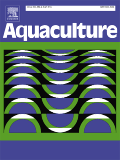
AQUACULTURE
metrics 2024
Elevating knowledge in the realm of aquaculture.
Introduction
AQUACULTURE is a premier academic journal dedicated to the field of aquatic science, published by Elsevier. With a robust Impact Factor, the journal is renowned for its significant contributions to aquatic biology and the sustainable development of aquaculture practices. Since its inception in 1972, AQUACULTURE has established itself as an essential resource for researchers and professionals in the industry, regularly ranked in the Q1 category of aquatic science journals and positioned in the 14th percentile of its field according to Scopus rankings. Covering a wide array of topics including fish biology, aquaculture technology, sustainable practices, and environmental impacts, AQUACULTURE aims to disseminate innovative research findings that drive the industry forward. The journal, accessible to a global audience from its base in the Netherlands, continues to foster collaboration, discussion, and application of research to both academic and practical realms within aquaculture. Researchers and students alike will find valuable insights and current trends in this highly respected publication.
Metrics 2024
 1.06
1.06 3.90
3.90 4.10
4.10 211
211Metrics History
Rank 2024
Scopus
IF (Web Of Science)
JCI (Web Of Science)
Quartile History
Similar Journals
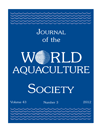
JOURNAL OF THE WORLD AQUACULTURE SOCIETY
Navigating the Future of Aquaculture TogetherThe JOURNAL OF THE WORLD AQUACULTURE SOCIETY, published by WILEY, serves as a premier platform for researchers, practitioners, and academics in the thriving fields of aquaculture and aquatic sciences. With an ISSN of 0893-8849 and an E-ISSN of 1749-7345, this esteemed journal boasts an impressive ranking in Scopus, placing it in the Q1 quartile for both Agronomy and Crop Science and Aquatic Science. Recognized for its rigorous peer-review process and high-quality publications since its inception in 1986, the journal continues to play a vital role in disseminating cutting-edge research that addresses the complex challenges and opportunities within aquaculture practices globally. The journal's impact is underscored by its rank of #37 out of 247 within the category of Aquatic Science and #70 out of 406 in Agronomy in 2023, positioning it firmly in the top tier of scholarly journals. Researchers and professionals will find an invaluable resource in this journal, which not only aims to advance scientific knowledge but also fosters a community committed to sustainable aquatic development.
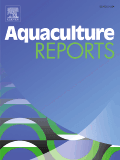
Aquaculture Reports
Pioneering Insights in Aquatic EcosystemsAquaculture Reports, published by Elsevier, is a prominent open-access journal dedicated to advancing knowledge in the fields of aquaculture, aquatic science, and animal science. Since its inception in 2015, this journal has quickly established itself as a leading platform for high-quality research, achieving a remarkable Q1 ranking in both Animal Science and Zoology and Aquatic Science as of 2023. With a Scopus ranking placing it in the top 7% of journals in Agricultural and Biological Sciences, Aquaculture Reports serves as an essential resource for researchers, professionals, and students alike, facilitating the exchange of innovative ideas and cutting-edge findings. The journal is indexed under ISSN 2352-5134 and is committed to fostering open access, ensuring that the latest research is readily available to the global scientific community. As it converges its years of publication from 2015 to 2024, Aquaculture Reports continues to shape the future of aquaculture research through rigorous peer-reviewed articles and impactful studies.

AQUACULTURE INTERNATIONAL
Navigating the Future of Aquatic Resource ManagementAquaculture International is a premier peer-reviewed journal dedicated to advancing the field of aquaculture and aquatic sciences. Published by Springer in the Netherlands, this journal has established itself as a critical resource for researchers, professionals, and students seeking to explore the latest advancements and innovations in the aquaculture industry. With an impressive impact ranking—Q2 in both Agronomy and Crop Science, and Aquatic Science as of 2023—this journal ranks favorably within its categories, placing in the top percentiles of Scopus' metrics. Covering a diverse array of topics related to sustainable aquaculture practices, species cultivation, and environmental impacts, Aquaculture International aims to foster dialogue and collaboration among scholars and industry practitioners. As the field evolves, the journal remains committed to publishing high-quality research that informs policy and practice, enhancing the sustainability of aquatic resources from 1993 to 2024 and beyond.

FISHERY TECHNOLOGY
Transforming fisheries knowledge into practical solutions.FISHERY TECHNOLOGY is a distinguished journal dedicated to the advancement of knowledge in the field of fisheries science and technology. Published by the Society of Fisheries Technologists, India, this journal serves as a vital platform for researchers, professionals, and students across the globe to disseminate innovative findings and methodologies related to fishery practices, aquatic ecosystem management, and sustainable fishing technologies. With its ISSN 0015-3001, FISHERY TECHNOLOGY seeks to uphold the standards of scholarly research and contributes significantly to the discourse surrounding marine resources and their sustainable utilization. Although currently not available in an open-access format, the journal remains committed to reaching a wide audience through reputable distribution channels. The journal is characterized by its goal to bridge theoretical research with practical applications, thereby impacting both the scientific community and the fishing industry. Engage with FISHERY TECHNOLOGY to keep abreast of the latest developments and contribute to the sustainable management of aquatic resources.
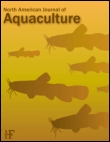
NORTH AMERICAN JOURNAL OF AQUACULTURE
Transforming aquaculture practices with cutting-edge research.North American Journal of Aquaculture, published by Wiley, is a premier resource in the field of aquatic science, dedicated to advancing knowledge and research in aquaculture practices across North America. With an ISSN of 1522-2055 and E-ISSN of 1548-8454, this journal serves as an essential platform for researchers, industry professionals, and students focusing on sustainable practices, species cultivation, and aquatic ecosystems. Notably, it ranks in the Q3 category in Aquatic Science according to the 2023 metrics, and stands at the 135th position out of 247 in the Scopus rankings for Agricultural and Biological Sciences—Aquatic Science, reflecting its contribution to the field. As the journal continues to evolve through its converged coverage from 1999 to 2024, it remains committed to disseminating impactful research while providing open access options to facilitate broad readership and engagement. The North American Journal of Aquaculture aims to inspire innovative solutions for the aquaculture sector while fostering a collaborative environment for aquatic science research.

ISRAELI JOURNAL OF AQUACULTURE-BAMIDGEH
Exploring the depths of aquatic sciences for a better tomorrow.Welcome to the Israeli Journal of Aquaculture-Bamidgeh, published by AquacultureHub Inc, a pivotal platform dedicated to advancing the field of aquaculture studies since its inception in 1988. With a focus on innovative research and practical applications within the realms of Agronomy and Aquatic Sciences, this journal has established a reputation for disseminating high-quality findings that contribute to sustainable practices in aquatic farming. The journal, although classified in the Q3 and Q4 quartiles for its respective categories, offers valuable insights for researchers and practitioners alike, allowing them to stay abreast of developments in aquaculture challenges and solutions. While it's currently not an Open Access journal, the Israeli Journal of Aquaculture-Bamidgeh is committed to providing a thorough avenue for scholarly exchange and fostering collaborations across the global aquaculture community. Explore impactful studies and the latest trends to enhance your knowledge and research in this vital sector.
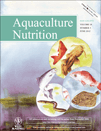
AQUACULTURE NUTRITION
Exploring innovative solutions for aquatic species' diets.Aquaculture Nutrition is a leading peer-reviewed journal published by Wiley-Hindawi, dedicated to advancing the field of aquatic sciences through high-quality research on nutritional physiology and feed management in aquaculture species. Established in 1995, and with its converged years running until 2024, this journal has garnered a prestigious Q1 ranking in Aquatic Science, reflecting its significant impact and relevance as one of the top journals in the sector, evidenced by its 91st percentile ranking in the Scopus database for Agricultural and Biological Sciences. Aquaculture Nutrition provides an essential platform for researchers, professionals, and students to explore innovative methodologies, nutritional strategies, and species-specific dietary needs, fostering sustainability and productivity in aquaculture practices. While the journal offers a hybrid of open access and subscription-based content, it remains a critical resource for academics wishing to contribute to or stay abreast of advancements in aquatic nutrition research. With its strong focus on the intersection of aquaculture and nutritional science, Aquaculture Nutrition plays a vital role in addressing global food security challenges and promoting sustainable practices in the aquaculture industry.
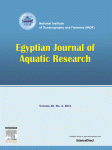
Egyptian Journal of Aquatic Research
Unveiling innovative research in water science.Welcome to the Egyptian Journal of Aquatic Research, a premier peer-reviewed academic journal published by ELSEVIER, dedicated to advancing the field of aquatic sciences. With a robust impact factor and recognition as a Q1 journal in key categories such as Aquatic Science and Ecology, this open access journal has established itself as a vital platform for disseminating high-quality research since its inception in 2012. The journal aims to provide comprehensive coverage of topics including ecology, evolutionary biology, and water science, making it a crucial resource for researchers, professionals, and students engaged in these dynamic fields. With Scopus rankings placing it in the top echelons of various categories, the Egyptian Journal of Aquatic Research fosters innovation, collaboration, and knowledge dissemination on a global scale, making it an indispensable asset for anyone invested in understanding and preserving aquatic systems.

BULLETIN OF THE EUROPEAN ASSOCIATION OF FISH PATHOLOGISTS
Elevating Standards in Fish Pathology Research.BULLETIN OF THE EUROPEAN ASSOCIATION OF FISH PATHOLOGISTS is a leading journal dedicated to advancing research and knowledge in the field of fish pathology, published by the European Association of Fish Pathologists. With its ISSN number 0108-0288, this journal has consistently contributed to the academic landscape since its inception in 1996. Based in the United Kingdom, this journal is recognized for its high-quality research output, holding a commendable Q2 ranking in both Aquatic Science and Small Animals categories as of 2023. The Scopus rankings further reflect its impact, notably securing a 10th rank in Veterinary Small Animals, showcasing its relevance and influence in the field. Although it does not offer Open Access, the content remains vital for researchers and practitioners invested in addressing the challenges associated with fish health and pathogens. The journal serves as a critical platform for sharing innovative studies, fostering collaborations, and informing ongoing developments in aquatic science. Its commitment to maintaining high standards ensures that it remains an essential resource for professionals, researchers, and students alike in pursuit of knowledge on fish pathology and aquatic health.

MARINE BIOTECHNOLOGY
Exploring the Depths of Marine InnovationMarine Biotechnology is a premier journal published by Springer, specializing in the interdisciplinary research at the intersection of marine biology and biotechnology. With an ISSN of 1436-2228 and a robust e-ISSN of 1436-2236, this journal has been a cornerstone for scholars and practitioners since its inception in 1999, and is positioned to continue shaping the field through 2024. Recognized for its contributions in Aquatic Science and Biotechnology, it currently holds a Q2 ranking in both categories for 2023, highlighting its relevance and impact within the global scientific community. With a Scopus rank of 64/247 in Aquatic Science and 149/311 in Biotechnology, Marine Biotechnology offers a vital platform for disseminating cutting-edge research that encompasses environmental sustainability, pharmaceutical applications, and bioinformatics. The journal promotes open access to its valuable content, ensuring that research is readily available to a wide audience. By bringing together leading researchers and fostering collaborations, Marine Biotechnology stands as an essential resource for those committed to advancing our understanding of marine resources and their applications in biotechnology.